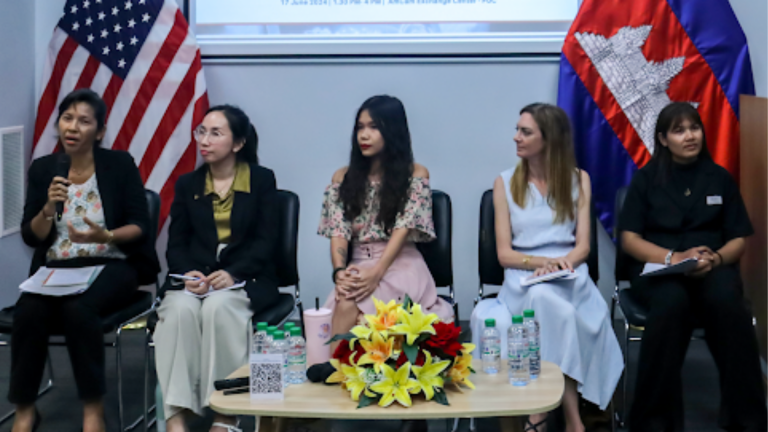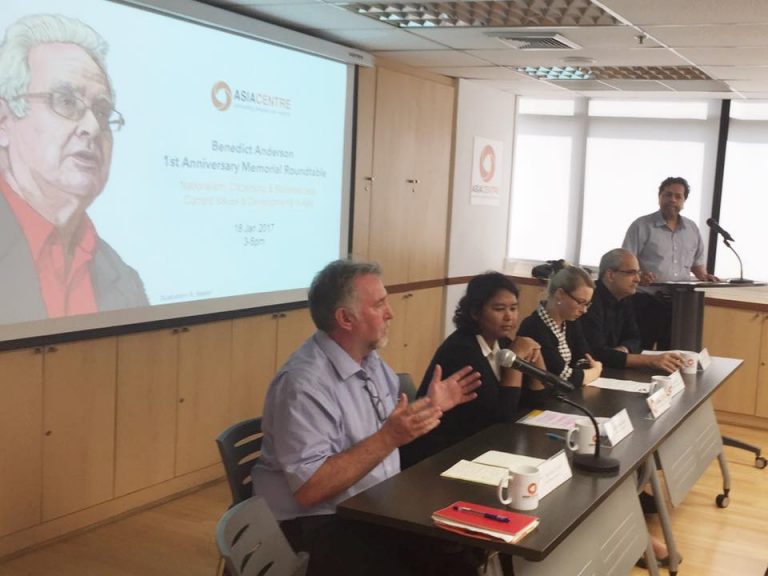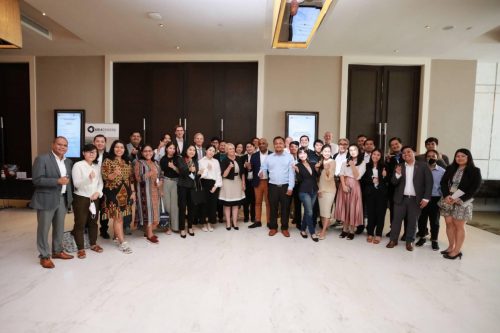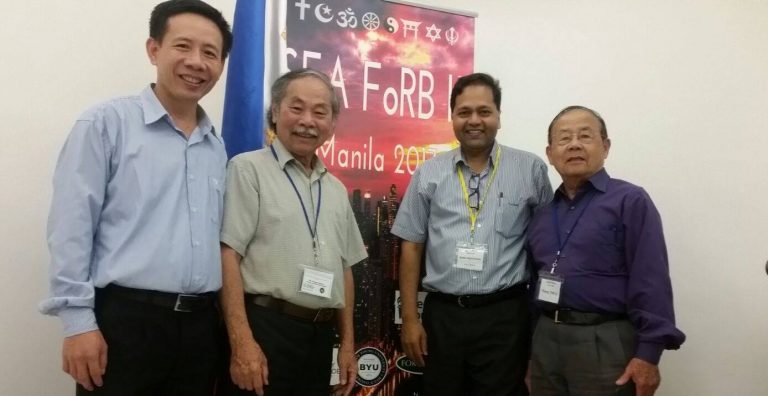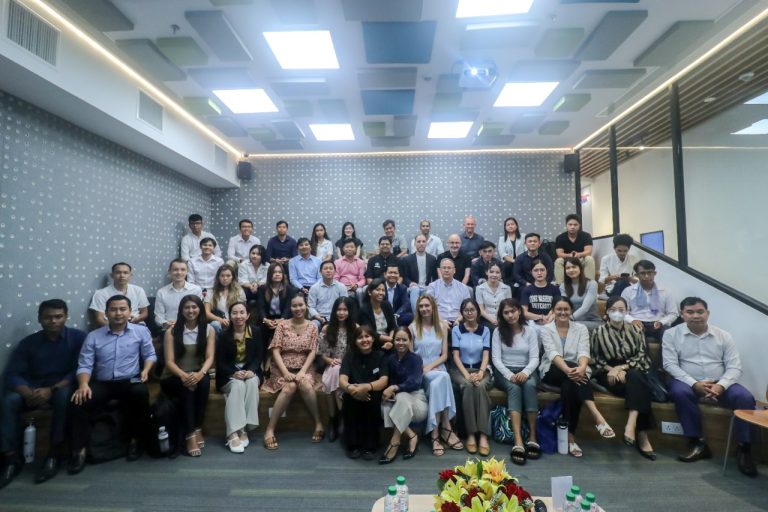
On 17 June 2024, nearly 50 representatives from local civil society organisations (CSOs) in Cambodia participated in the event “Digital Technology in Cambodia: Challenges and Opportunities” held in Phnom Penh. During the event, panellists and participants highlighted that, given the importance of artificial intelligence (AI) in shaping Cambodia’s society, the voices of CSOs must be heard in relevant discussions to ensure technological developments contribute to creating a just society.
During the event, five panellists shared their experiences of using digital technology in their work, reflecting on how the popularisation of these tools has transformed Cambodian society and discussing potential future changes in light of new developments like artificial intelligence.
The Asia Centre organised the event with the support of Google as part of the project Digital Rights Programme for Civil Society Organisations, spanning from November 2023 to October 2024. For this engagement in Phnom Penh, the AmCam Exchange Center – Pannasastra University of Cambodia hosted the event at their premises.
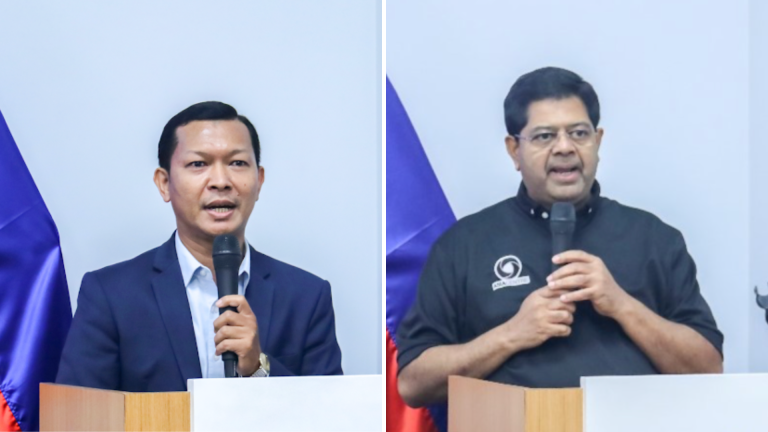
The event began with opening remarks from Dr Chea Sophea, Executive Director of the AmCam Exchange Centre. He emphasised the importance of having more meeting spaces and opportunities for a wide range of stakeholders to discuss critical issues facing Cambodian society, such as the challenges and opportunities arising from the country’s digital transformation.
Dr James Gomez, Asia Centre’s Regional Director, also delivered opening remarks. He brought to the attention of the audience that Cambodia ranks 145th out of 193 countries in AI readiness with a score of 31.88 (where 0 is the lowest and 100 is the highest). Dr Gomez stressed the importance of gatherings like this to openly discuss how AI and digital tools which can help Cambodian society move forward in technology journey.
During the panel discussion, five female speakers representing different civil society sectors in Cambodia provided their insights on using technology in their respective professions. Their views added significant value to the discussion about the role of technology in shaping Cambodian society. They highlighted not only how technology has transformed the country over the past 15 years but also how they expect recent developments will further impact it.
The first speaker was Professor Meas Nearyroth, Assistant Dean of the Faculty of Education at Pannasastra University of Cambodia. During her presentation, she outlined how digital technology in the education sector has become particularly relevant from the COVID-19 pandemic onwards. On the one hand, digital technology offers endless opportunities to implement new pedagogical approaches in learning spaces, such as flipped classrooms, personalised learning, and better accessibility to resources. On the other hand, tools like AI pose new challenges, including plagiarism and a lack of critical engagement with data. Professor Nearyroth emphasised the need for further discussions to maximise the benefits of technology and AI while addressing these challenges.
Siv Vatana, Research and Web Content Manager at Open Development Cambodia discussed the country’s digital transformation from a regulatory perspective. She emphasised that while digital technology offers endless opportunities for Cambodian society, it requires thorough and fair regulations to ensure these technologies benefit everyone. This includes easier access to draft laws to allow for more public input before they are passed as laws. She also stressed the importance of making Cambodia’s digital transformation as inclusive as possible, ensuring all social groups can voice their concerns and needs. Vatana highlighted the necessity of more multi-stakeholder discussions on technology to achieve these goals.
The third speaker was Catherina Harry, a content creator and influencer with her YouTube channel “A Dose of Cath.” She used her experience in creating digital content to highlight the importance of fostering an interconnected society where everyone with a smartphone can share their stories, creating content that resonates with people. She also addressed the challenges associated with owning a digital device connected to the internet, focusing on data governance. While smartphones have become indispensable tools for millions of people in Cambodia, Catherina stressed that they are also tracking devices, leaving numerous digital footprints. She urged users to carefully consider these aspects to ensure their privacy and safety.
Marissa Carruthers, editor at Kiripost, shared her insights on the opportunities and challenges associated with digital technology from the perspective of media outlets. She noted that media was one of the first sectors to benefit from the widespread use of digital technology. Marissa highlighted the opportunities that arise from the ability to share information without the filters that have long characterised traditional media, both in Cambodia and globally. However, she stressed that limited digital media literacy challenges the potential benefits of digital technology. For example, the spread of disinformation is a significant issue. Without the relevant skills and media literacy, users have fewer tools to identify inaccurate information and are more likely to share it, thus amplifying false messages.
Eng SreyPov, Senior Project Officer at the Cambodian Youth Network, discussed the role of technology in Cambodia, highlighting two main points. Firstly, she emphasised the importance of digital technology in online campaigning and governance, noting how new communication channels have enhanced these efforts. Secondly, SreyPov addressed two significant challenges. Firstly, echoing previous discussions, she highlighted the critical need for quality education on digital technology use, especially among youth and those in remote areas. Secondly, she underscored the relative lack of awareness about digital security threats among the public, which poses a major challenge to people’s privacy and online safety.
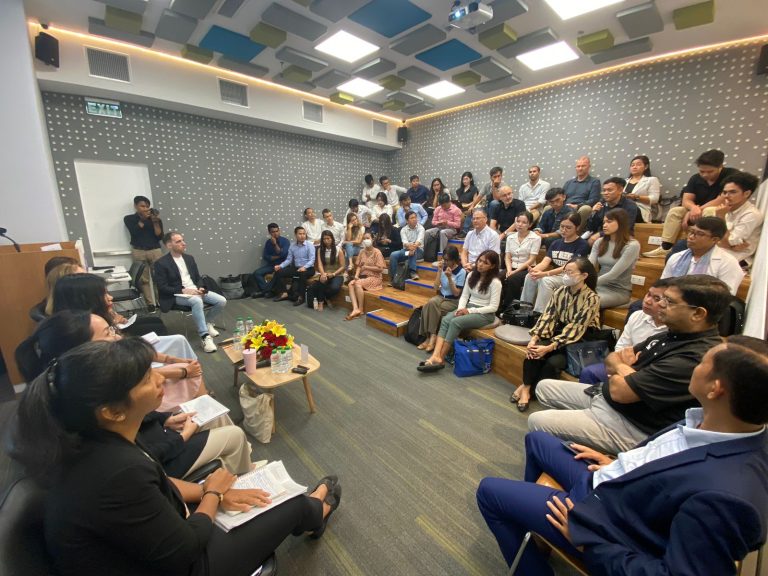
The insights shared by all five speakers sparked meaningful exchanges among participants, with questions and comments directed towards the panellists and fellow attendees. The discussion highlighted a common concern: many civil society stakeholders feel overlooked in discussions about Cambodia’s digital transformation. Participants expressed particular concern regarding AI and cybersecurity, emphasising that while they acknowledge the benefits of current and ongoing technological developments, they feel their voices are not sufficiently heard in shaping regulations and laws. There is a strong desire for inclusive dialogue to ensure that all stakeholders provide input into these crucial areas.

Asia Centre’s Dr James Gomez closed the event, expressing gratitude to all speakers and participants for their attendance and valuable input shared during the Q&A session. He expressed hope that this event will mark the beginning of many more engagements focusing on the role of technology in Cambodia, aimed at amplifying the voices of stakeholders who have historically been underrepresented in such discussions.
The event concluded with a networking session where speakers and participants continued their engagements to identify common ground for potential collaborations. This underscored the anticipated importance of digital technology in shaping Cambodia’s future.
To watch the highlights of the Country Meeting in Cambodia, click here.
Upcoming online sessions of the Digital Rights Programme for CSOs in 2024 will cover Surveillance & Privacy (18 July). In August and September there will invite only online community discussions to plan for the October on-site meeting in Malaysia.
Asia Centre is a civil society research institute in Special Consultative Status with the United Nations Economic and Social Council. It serves as a knowledge partner and undertakes evidence-based research as well as provides capacity-building training for end beneficiaries. If you would like to collaborate with the Centre, please send an expression of interest to contact@asiacentre.org.
Follow Asia Centre’s social media channels for more information.

